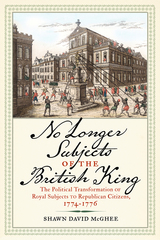133 start with F start with F



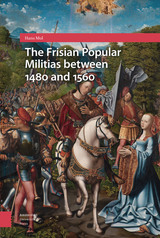
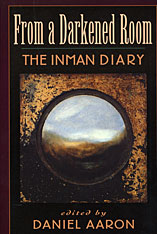
Only a few of us seek immortality, and fewer still by writing. But Arthur Inman challenged the odds. He calculated that if he kept a diary and spared no thoughts or actions, was entirely honest and open, and did not care about damage or harm to himself or others, he would succeed in gaining attention beyond the grave that he could not attain in life.
The diary became a many-layered and strikingly animated work of a gifted writer, by turns charming, repellent, shocking, cruel, and comical. But the diary is also an uninhibited history of his times, of his eccentricities and fantasies, of his bizarre marriage arrangements and sexual adventures. Inman’s explorations of his own troubled nature made him excessively curious about the secret lives of others. Like some ghostly doctor-priest, he chronicled their outpourings of head and heart as vividly as he did his own. The diary reads like a nonfiction novel as it moves inexorably toward disaster.
This is an abridged version of the celebrated two-volume work published by Harvard as The Inman Diary: A Public and Private Confession.

The American Civil War and the Paris Commune of 1871, Philip Katz argues, were part of the broader sweep of transatlantic development in the mid-nineteenth century--an age of democratic civil wars. Katz shows how American political culture in the period that followed the Paris Commune was shaped by that event.
The telegraph, the new Atlantic cable, and the news-gathering experience gained in the Civil War transformed the Paris Commune into an American national event. News from Europe arrived in fragments, however, and was rarely cohesive and often contradictory. Americans were forced to assimilate the foreign events into familiar domestic patterns, most notably the Civil War. Two ways of Americanizing the Commune emerged: descriptive (recasting events in American terms in order to better understand them) and predictive (preoccupation with whether Parisian unrest might reproduce itself in the United States).
By 1877, the Commune became a symbol for the domestic labor unrest that culminated in the Great Railroad Strike of that year. As more powerful local models of social unrest emerged, however, the Commune slowly disappeared as an active force in American culture.
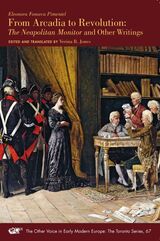
The Other Voice in Early Modern Europe: The Toronto Series, Volume 67
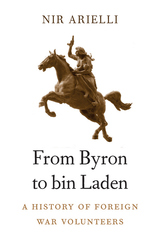
What makes people fight and risk their lives for countries other than their own? Why did diverse individuals such as Lord Byron, George Orwell, Che Guevara, and Osama bin Laden all volunteer for ostensibly foreign causes? Nir Arielli helps us understand this perplexing phenomenon with a wide-ranging history of foreign-war volunteers, from the wars of the French Revolution to the civil war in Syria.
Challenging narrow contemporary interpretations of foreign fighters as a security problem, Arielli opens up a broad range of questions about individuals’ motivations and their political and social context, exploring such matters as ideology, gender, international law, military significance, and the memory of war. He shows that even though volunteers have fought for very different causes, they share a number of characteristics. Often driven by a personal search for meaning, they tend to superimpose their own beliefs and perceptions on the wars they join. They also serve to internationalize conflicts not just by being present at the front but by making wars abroad matter back at home. Arielli suggests an innovative way of distinguishing among different types of foreign volunteers, examines the mixed reputation they acquire, and provides the first in-depth comparative analysis of the military roles that foreigners have played in several conflicts.
Merging social, cultural, military, and diplomatic history, From Byron to bin Laden is the most comprehensive account yet of a vital, enduring, but rarely explored feature of warfare past and present.
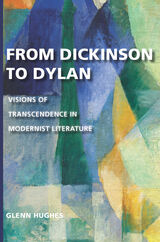
This work is unique in its extended focus, in a comparative study spanning a century, on the persistence and centrality in modernist literature of the struggle to understand and articulate the dependence of human meaning on the mystery of transcendent meaning. Hughes shows us that each of these authors is a mystic in his or her way, and that none are tempted by the modern inclination to suppose that meaning originates with human beings. Together, they address one of the most difficult and important challenges of modern literature: how to be a mystic in modernity.
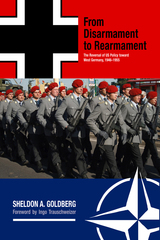
At the end of World War II, the Allies were unanimous in their determination to disarm the former aggressor Germany. As the Cold War intensified, however, the decision whether to reverse that policy and to rearm West Germany as a bulwark against the Soviet threat led to disagreements both within the US government and among members of the nascent NATO alliance. The US military took the practical view that a substantial number of German troops would be required to deter any potential Soviet assault. The State Department, on the other hand, initially advocated an alternative strategy of strengthening European institutions but eventually came around to the military’s position that an armed West Germany was preferable to a weak state on the dividing line between the Western democracies and the Soviet satellite states.
Sheldon A. Goldberg traces the military, diplomatic, and political threads of postwar policy toward West Germany and provides insights into the inner workings of alliance building and the roles of bureaucrats and military officers as well as those of diplomats and statesmen. He draws on previously unexamined primary sources to construct a cogent account of the political and diplomatic negotiations that led to West Germany’s accession to NATO and the shaping of European order for the next forty years.
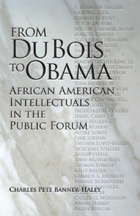
In his groundbreaking new book Charles Pete Banner-Haley explores the history of African American intellectualism and reveals the efforts of black intellectuals in the ongoing struggle against racism, showing how they have responded to Jim Crow segregation, violence against black Americans, and the more subtle racism of the postintegration age. Banner-Haley asserts that African American intellectuals—including academicians, social critics, activists, and writers—serve to generate debate, policy, and change, acting as a moral force to persuade Americans to acknowledge their history of slavery and racism, become more inclusive and accepting of humanity, and take responsibility for social justice.
Other topics addressed in this insightful study include the disconnection over time between black intellectuals and the masses for which they speak; the ways African American intellectuals identify themselves in relation to the larger black community, America as a whole, and the rest of the world; how black intellectuals have gained legitimacy in American society and have accrued moral capital, especially in the area of civil rights; and how that moral capital has been expended. Among the influential figures covered in the book are W. E. B. Du Bois, Ralph Ellison, Richard Wright, James Weldon Johnson, E. Franklin Frazier, Ralph Bunche, Oliver C. Cox, George S. Schuyler, Zora Neale Hurston, Martin Luther King, Jr., Jesse Jackson, Cornel West, Toni Morrison, bell hooks, Charles Johnson, and Barack Obama.
African American intellectuals, as Banner-Haley makes clear, run the political gamut from liberal to conservative. He discusses the emergence of black conservatism, with its accompanying questions about affirmative action, government intervention on behalf of African Americans, and the notion of a color-blind society. He also looks at how popular music—particularly rap and hip-hop—television, movies, cartoons, and other media have functioned as arenas for investigating questions of identity, exploring whether African American intellectuals can also be authentically black.
A concluding discussion of the so-called browning of America, and the subsequent rise in visibility and influence of black intellectuals culminates with the historic election of President Barack Obama, an African American intellectual who has made significant contributions to American society through his books, articles, and speeches. Banner-Haley ponders what Obama’s election will mean for the future of race relations and black intellectualism in America.
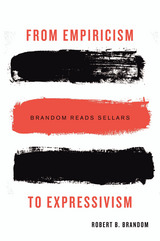
The American philosopher Wilfrid Sellars ranks as one of the leading twentieth-century critics of empiricism—a philosophical approach to knowledge that seeks to ground it in human sense experience. Sellars stood in the forefront of a recoil within analytic philosophy from the foundationalist assumptions of contemporary empiricists. From Empiricism to Expressivism is a far-reaching reinterpretation of Sellars from one of the philosopher’s most brilliant intellectual heirs.
Unifying and extending Sellars’s most important ideas, Robert Brandom constructs a theory of pragmatic expressivism which, in contrast to empiricism, understands meaning and knowledge in terms of the role expressions play in social practices. The key lies in Sellars’s radical reworking of Kant’s idea of the categories: the idea that the expressive job characteristic of many of the most important philosophical concepts is not to describe or explain the empirical world but rather to make explicit essential features of the conceptual framework that makes description and explanation possible.
Brandom reconciles otherwise disparate elements of Sellars’s system, revealing a greater level of coherence and consistency in the philosopher’s arguments against empiricism than has usually been acknowledged. From Empiricism to Expressivism clarifies what Sellars had in mind when he talked about moving analytic philosophy from its Humean to its Kantian phase, and why such a move might be of crucial importance today.
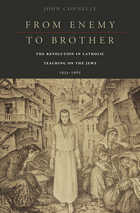
In 1965 the Second Vatican Council declared that God loves the Jews. Before that, the Church had taught for centuries that Jews were cursed by God and, in the 1940s, mostly kept silent as Jews were slaughtered by the Nazis. How did an institution whose wisdom is said to be unchanging undertake one of the most enormous, yet undiscussed, ideological swings in modern history?
The radical shift of Vatican II grew out of a buried history, a theological struggle in Central Europe in the years just before the Holocaust, when a small group of Catholic converts (especially former Jew Johannes Oesterreicher and former Protestant Karl Thieme) fought to keep Nazi racism from entering their newfound church. Through decades of engagement, extending from debates in academic journals, to popular education, to lobbying in the corridors of the Vatican, this unlikely duo overcame the most problematic aspect of Catholic history. Their success came not through appeals to morality but rather from a rediscovery of neglected portions of scripture.
From Enemy to Brother illuminates the baffling silence of the Catholic Church during the Holocaust, showing how the ancient teaching of deicide—according to which the Jews were condemned to suffer until they turned to Christ—constituted the Church’s only language to talk about the Jews. As he explores the process of theological change, John Connelly moves from the speechless Vatican to those Catholics who endeavored to find a new language to speak to the Jews on the eve of, and in the shadow of, the Holocaust.
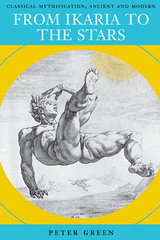
"I hadn't, till I really started digging, gauged the fierce intensity of the need for myth in the human psyche, of any age, or sensed the variety of motives dictating that need," writes Peter Green in the introduction to this wide-ranging collection of essays on classical mythology and the mythic experience. Using the need for myth as the starting point for exploring a number of topics in Greek mythology and history, Green advances new ideas about why the human urge to make myths persists across the millennia and why the borderland between mythology and history can sometimes be hard to map.
Green looks at both specific problems in classical mythology and larger theoretical issues. His explorations underscore how mythic expression opens a door into non-rational and quasi-rational modes of thought in which it becomes possible to rewrite painful truths and unacceptable history—which is, Green argues, a dangerous enterprise. His study of the intersections between classical mythology and Greek history ultimately drives home a larger point, "the degree of mythification and deception (of oneself no less than of others) of which the human mind is capable."
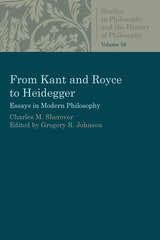
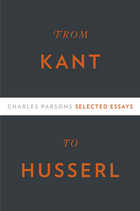
In From Kant to Husserl, Charles Parsons examines a wide range of historical opinion on philosophical questions, from mathematics to phenomenology. Amplifying his early ideas on Kant’s philosophy of arithmetic, Parsons uses Kant’s lectures on metaphysics to explore how his arithmetical concepts relate to the categories. He then turns to early reactions by two immediate successors of Kant, Johann Schultz and Bernard Bolzano, to shed light on disputed questions regarding interpretation of Kant’s philosophy of mathematics. Interested, as well, in what Kant meant by “pure natural science,” Parsons considers the relationship between the first Critique and the Metaphysical Foundations of Natural Science. His commentary on Kant’s Transcendental Aesthetic departs from mathematics to engage the vexed question of what it tells about the meaning of Kant’s transcendental idealism.
Proceeding on to phenomenology, Parsons examines Frege’s evolving idea of extensions, his attitude toward set theory, and his correspondence, particularly exchanges with Russell and Husserl. An essay on Brentano brings out, in the case of judgment, an alternative to the now standard Fregean view of negation, and, on truth, alternatives to the traditional correspondence view that are still discussed today. Ending with the question of why Husserl did not take the “linguistic turn,” a final essay included here marks the only article-length discussion of Husserl Parsons has ever written, despite a long-standing engagement with this philosopher.

In recent years a prominent trend in the study of European modernism and the avant-garde has been increased attention to texts and traditions that have long stood in the shadow of the French, German, and British traditions that dominate the canon. Yet this more expansive view of European modernism and the avant-garde has been hindered by the limited range of texts available outside the original languages. This book addresses that problem by offering a wide-ranging selection of literary, theoretical, and documentary sources from one of the most dynamic and original European avant-garde traditions: that of the first Czechoslovak Republic and of the Bohemian lands. The Czech avant-garde is in many respects the ideal “alternative” avant-garde to present in detail to a wider readership: it tracks Central European developments and was often influential internationally while being deeply embedded in particular cultural dynamics that produced original forms. This volume returns interwar Czech avant-garde writings to their place as a firmly embedded component of the European avant-garde.
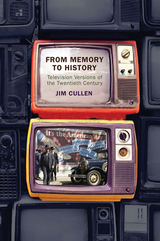
From Memory to History takes readers on a journey through over fifty years of historical dramas and sitcoms that were set in earlier decades of the twentieth century. Along the way, it explores how comedies like M*A*S*H and Hogan’s Heroes offered veiled commentary on the Vietnam War, how dramas ranging like Mad Men echoed current economic concerns, and how The Americans and Halt and Catch Fire used the Cold War and the rise of the internet to reflect upon the present day. Cultural critic Jim Cullen is lively, informative, and incisive, and this book will help readers look at past times, present times, and prime time in a new light.
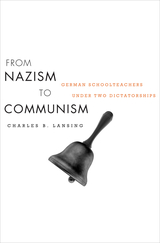
Tracing teachers' experiences in the Third Reich and East Germany, Charles Lansing analyzes developments in education of crucial importance to both dictatorships. Lansing uses the town of Brandenburg an der Havel as a case study to examine ideological reeducation projects requiring the full mobilization of the schools and the active participation of a transformed teaching staff. Although lesson plans were easily changed, skilled teachers were neither quickly made nor easily substituted. The men and women charged in the postwar era with educating a new “antifascist” generation were, to a surprising degree, the same individuals who had worked to “Nazify” pupils in the Third Reich. But significant discontinuities existed as well, especially regarding the teachers' professional self-understanding and attitudes toward the state-sanctioned teachers' union. The mixture of continuities and discontinuities helped to stabilize the early GDR as it faced its first major crisis in the uprising of June 17, 1953.
This uniquely comparative work sheds new light on an essential story as it reconceptualizes the traditional periodization of postwar German and European history.

In paperback for the first time, From Racism to Genocide is an explosive, richly detailed account of how Nazi anthropologists justified racism, developed practical applications of racist theory, and eventually participated in every phase of the Holocaust.
Using original sources and previously unpublished documentation, Gretchen E. Schafft shows the total range of anti-human activity from within the confines of a particular discipline. Based on seven years of archival research in the United States and abroad, the work includes many original photos and documents, most of which have never before been published. It uses primary data and original texts whenever possible, including correspondence written by perpetrators. The book also reveals that the United States was not merely a bystander in this research, but instead contributed professional and financial support to early racial research that continued through the first five years of Hitler’s regime.
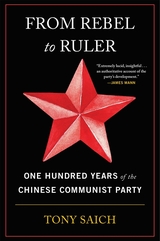
A Project Syndicate Best Read of the Year
On the centennial of the founding of the Chinese Communist Party, the definitive history of how Mao and his successors overcame incredible odds to gain and keep power.
Mao Zedong and the twelve other young men who founded the Chinese Communist Party in 1921 could hardly have imagined that less than thirty years later they would be rulers. On its hundredth anniversary, the party remains in command, leading a nation primed for global dominance.
Tony Saich tells the authoritative, comprehensive story of the Chinese Communist Party—its rise to power against incredible odds, its struggle to consolidate rule and overcome self-inflicted disasters, and its thriving amid other communist parties’ collapse. Saich argues that the brutal Japanese invasion in the 1930s actually helped the party. As the Communists retreated into the countryside, they established themselves as the populist, grassroots alternative to the Nationalists, gaining the support they would need to triumph in the civil war. Once in power, however, the Communists faced the difficult task of learning how to rule. Saich examines the devastating economic consequences of Mao’s Great Leap Forward and the political chaos of the Cultural Revolution, as well as the party’s rebound under Deng Xiaoping’s reforms.
Leninist systems are thought to be rigid, yet the Chinese Communist Party has proved adaptable. From Rebel to Ruler shows that the party owes its endurance to its flexibility. But is it nimble enough to realize Xi Jinping’s “China Dream”? Challenges are multiplying, as the growing middle class makes new demands on the state and the ideological retreat from communism draws the party further from its revolutionary roots. The legacy of the party may be secure, but its future is anything but guaranteed.
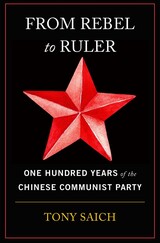
“The definitive, candid, and absorbing history of a political organization…A vital account, based on magnificent research, that shows the party as a colossal, relentless, and enduring machine.”—Jane Perlez, former Beijing Bureau Chief, New York Times
“If you were to travel back in time to 1921 and predict that the Communist Party of China would rule over the world’s second-largest economy 100 years later, no one would believe you. In this definitive primer, Tony Saich explains how the impossible came true.”—Yuen Yuen Ang, Project Syndicate
“An extremely lucid, insightful history of the Chinese Communist Party. Saich’s readable narrative takes the CCP from its origins as a tiny group of revolutionaries…to the powerful, repressive rulers of a world power today.”—James Mann, author of The China Fantasy
Mao Zedong and the twelve young men who founded the Chinese Communist Party in 1921 could hardly have imagined that less than thirty years later, they would rule China. Over a century later the party remains in command, leading a nation primed for global dominance.
From Rebel to Ruler is a landmark history of the Chinese Communist Party—its rise against incredible odds, its struggle to consolidate power and overcome self-inflicted disasters, and its ability to thrive long after the collapse of the Soviet Union and dissolution of other communist parties. Leninist systems are thought to be rigid, yet the Chinese Communist Party has proved adaptable. Tony Saich shows that the party owes its endurance to its flexibility. But is it nimble enough to realize Xi Jinping’s “China Dream”? Challenges are multiplying, as a restless middle class makes new demands and the party strays ever further from its revolutionary roots.

Nancy Sinkoff's new introduction explores the historical forces, particularly the dynamic world of secular Yiddish culture, which shaped Dawidowicz's decision to journey to Poland and her reassessment of those forces in the last years of her life.

From the Blue Windows is a collection of Tan Kok Yang's memories of growing up in Queenstown back when the tallest residential building there was fourteen storeys, the Alexandra Canal flooded regularly, and wayang shows were a regular feature on Mei Ling Street. He stayed in Princess Estate, an area that was colloquially known as "the Blue Windows" because of its unique blue glass louvred windows.
With nostalgia and a sense of loss, this memoir is a personal tribute to and celebration of Queenstown and a simple but fulfilling way of life that has all but vanished from modern Singapore.
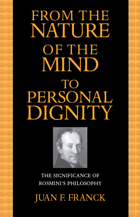
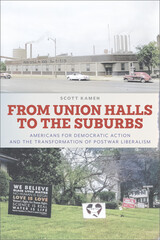
For decades, Americans for Democratic Action (ADA) exerted an outsized pull on the political stage. Formed in 1947 by anticommunist liberals such as economist John Kenneth Galbraith and historian Arthur Schlesinger Jr., the ADA established itself as the most prominent liberal organization in the United States for more than a quarter century. Shaped by the ADA, the New Politics movement upended Democratic Party politics with its challenge to the Vietnam War, demands for redistributive economic policies, and development of a far-reaching politics of race, gender, and sexuality.
By bringing the ADA and its influential public intellectuals into the story of the New Politics movement, Scott Kamen reveals how American liberalism shifted away from the working-class concerns of the New Deal era and began to cater to the interests of a new, suburban professional class. By the 1980s, many Democratic politicians, activists, and voters had embraced a neoliberal ideology that coupled socially liberal attitudes with market-based solutions, eschewing an older progressive politics steeped in labor issues.
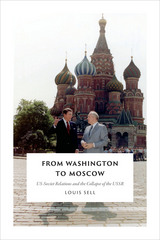
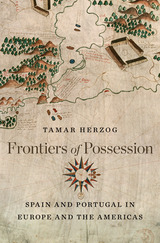
Frontiers of Possession asks how territorial borders were established in Europe and the Americas during the early modern period and challenges the standard view that national boundaries are largely determined by military conflicts and treaties. Focusing on Spanish and Portuguese claims in the New and Old Worlds, Tamar Herzog reconstructs the different ways land rights were negotiated and enforced, sometimes violently, among people who remembered old possessions or envisioned new ones: farmers and nobles, clergymen and missionaries, settlers and indigenous peoples.
Questioning the habitual narrative that sees the Americas as a logical extension of the Old World, Herzog portrays Spain and Portugal on both sides of the Atlantic as one unified imperial space. She begins in the Americas, where Iberian conquerors had to decide who could settle the land, who could harvest fruit and cut timber, and who had river rights for travel and trade. The presence of indigenous peoples as enemies to vanquish or allies to befriend, along with the vastness of the land, complicated the picture, as did the promise of unlimited wealth. In Europe, meanwhile, the formation and re-formation of boundaries could last centuries, as ancient entitlements clashed with evolving economic conditions and changing political views and juridical doctrines regarding how land could be acquired and maintained.
Herzog demonstrates that the same fundamental questions had to be addressed in Europe and in the Americas. Territorial control was always subject to negotiation, as neighbors and outsiders, in their quotidian interactions, carved out and defended new frontiers of possession.

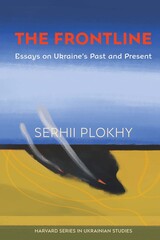
The Frontline presents a selection of essays drawn together for the first time to form a companion volume to Serhii Plokhy’s The Gates of Europe and Chernobyl. Here he expands upon his analysis in earlier works of key events in Ukrainian history, including Ukraine’s complex relations with Russia and the West, the burden of tragedies such as the Holodomor and World War II, the impact of the Chernobyl nuclear disaster, and Ukraine’s contribution to the collapse of the Soviet Union.
Juxtaposing Ukraine’s history to the contemporary politics of memory, this volume provides a multidimensional image of a country that continues to make headlines around the world. Eloquent in style and comprehensive in approach, the essays collected here reveal the roots of the ongoing political, cultural, and military conflict in Ukraine, the largest country in Europe.
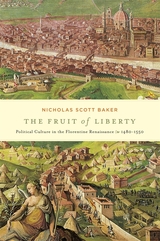
In the middle decades of the sixteenth century, the republican city-state of Florence--birthplace of the Renaissance--failed. In its place the Medici family created a principality, becoming first dukes of Florence and then grand dukes of Tuscany. The Fruit of Liberty examines how this transition occurred from the perspective of the Florentine patricians who had dominated and controlled the republic. The book analyzes the long, slow social and cultural transformations that predated, accompanied, and facilitated the institutional shift from republic to principality, from citizen to subject.
More than a chronological narrative, this analysis covers a wide range of contributing factors to this transition, from attitudes toward office holding, clothing, and the patronage of artists and architects to notions of self, family, and gender. Using a wide variety of sources including private letters, diaries, and art works, Nicholas Baker explores how the language, images, and values of the republic were reconceptualized to aid the shift from citizen to subject. He argues that the creation of Medici principality did not occur by a radical break with the past but with the adoption and adaptation of the political culture of Renaissance republicanism.
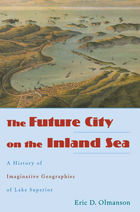
Winner of the AAG’s John Brinckerhoff Jackson Prize
Winner of the Great Lakes American Studies Association/Ohio University Press Book Award
Throughout the nineteenth century, the southern shores of Lake Superior held great promise for developers imagining the next great metropolis. These new territories were seen as expanses to be filled, first with romantic visions, then with scientific images, and later with vistas designed to entice settlement and economic development. The Future City on the Inland Sea describes the attempts of explorers under government, commercial, or scientific sponsorship to project their imaginative visions on a region where the future did not happen as planned.
Author Eric D. Olmanson takes a fresh look at the settlements in the vicinity of Chequamegon Bay and the Apostle Islands by analyzing the texts and images left by the missionaries, geologists, ordinance surveyors, newspaper editors, and boosters. The Future City on the Inland Sea shows how new visions of the place absorbed and replaced the old ones, eventually producing what might be called for the first time “a region.”
More than a regional geography, The Future City on the Inland Sea is an appraisal of these early efforts to meld geographies of physical nature with those of human ideals, a demonstration of how thoroughly and paradoxically those two realms are entangled.
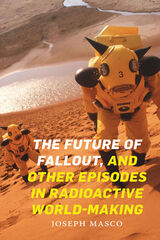
READERS
Browse our collection.
PUBLISHERS
See BiblioVault's publisher services.
STUDENT SERVICES
Files for college accessibility offices.
UChicago Accessibility Resources
home | accessibility | search | about | contact us
BiblioVault ® 2001 - 2024
The University of Chicago Press




